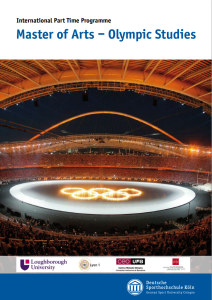Master of Arts in Olympic Studies
CEO-UAB is partner in the Master of Arts in Olympic Studies, an international part time programme specialized in Olympic studies. The M.A. is an international programme in Olympic Studies. It is a two year programme organized in six modules of 6 working days each and a thesis.
 The programme has been developed by a core network of universities, including the German Sport University Cologne, University of Mainz, Loughborough University, Autonomous University of Barcelona and University of Lyon. The IOC Olympic Studies Centre has contributed to the development of the academic project.
The programme has been developed by a core network of universities, including the German Sport University Cologne, University of Mainz, Loughborough University, Autonomous University of Barcelona and University of Lyon. The IOC Olympic Studies Centre has contributed to the development of the academic project.
CEO-UAB is responsible for the teaching module on Olympic Games, media and commercialisation, coordinated by Dr. Emilio Fernández Peña, Director of CEO-UAB. Through the sessions, students learn on the extent to which this presents challenges to traditional IOC policies and Olympic values, by developing an understanding of the influence of media and commercialisation on the Olympic Movement and a critical understanding the commercial and media strategies of the IOC, OCOGs and TOP sponsors. Students also gain knowledge on the impact of new media on the relationship between the Olympic movement, media, and consumers.
Main objectives
The main objectives of the study programme are to:
- enhance the individual participant’s Olympic knowledge in social sciences and humanities;
- promote the individual participant’s critical appreciation of the nature and significance of values in the advocacy and practice of Olympism, Olympic Sport and the Olympic Movement;
- foster critical reflection on processes of continuity and transformation in the Olympic Movement and on the relationship between Olympism and Olympic practices and wider social contexts, and to
- develop the individual participant’s capacity to undertake independent research on relevant areas of the Olympic Movement by using appropriate methodologies.
Curriculum overview
The M.A. is a part-time programme spread over two years with 4 terms of study. It consists of six taught modules and the submission of a thesis. The modules are organized on a weekly schedule (6 working days per module). Per term, two single weeks of on-campus studies are compulsory. The following modules are taught in the programme:
Module 1: Ethics, Values, and Olympic Education. History of Olympism; sport, ethics and Olympic values; Olympic education; concepts and their evaluation; Olympism and culture.
Module 2: Olympic Athletes and Elite Sport in Transition. History of Olympism; sport, ethics and Olympic values; Olympic education; concepts and their evaluation; Olympism and culture.
Module 3: Research Methodologies in Olympic Studies. Introduction to research methods in humanities and social sciences; philosophy of methodology in social sciences and humanities; qualitative and quantitative research methods; resources in Olympic research.
Module 4: Governance, Policy and Olympic Organisations. Olympic legal and organisational structures; Olympism and good governance; sustainability, environmentalism and security; Olympic legacies and impacts.
Module 5: Olympic Games – Media and Commercialisation. Nature and evolution of the Olympic Games as a mega event; the role of media and media representation; audience experience of the Olympic Games; trends, benefits and limits of sponsorship; marketing and commercial opportunities.
Module 6: International Relations and the Olympic Movement. Role of sport in international relations; Olympic truce concept; use of Olympic phenomena as tool of diplomacy; politics of divided nations and the Olympic Movement; role of sport in humanitarian programmes; sport development programmes.




